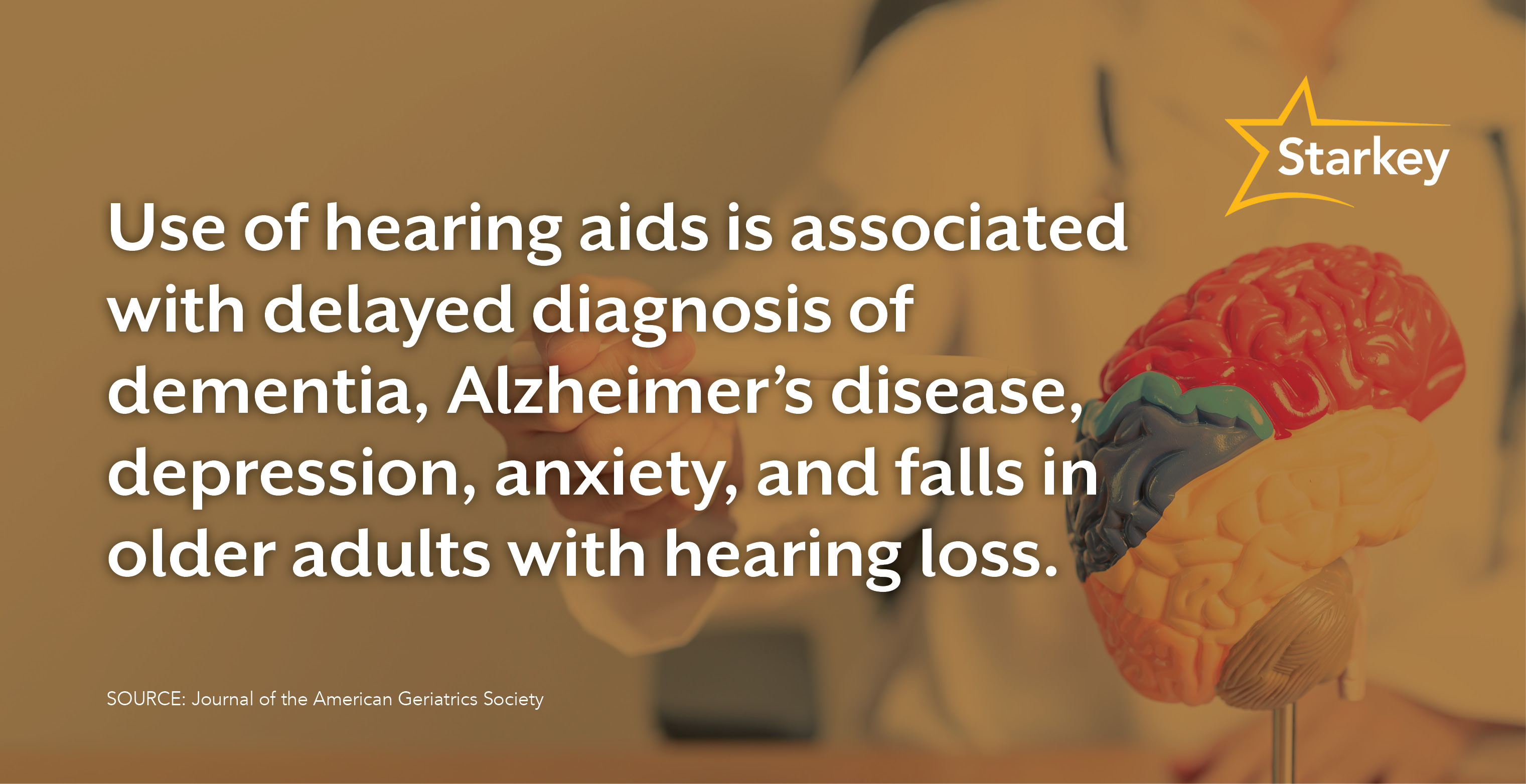Treating hearing loss is filled with benefits from improving conversation to never missing a moment. But as today’s hearing fact shows, the advantages only get greater, underscoring that better hearing health is directly linked to better overall health.
So, even though the risk of dementia, depression, anxiety, and falls increases as we age, thankfully there’s something that people with hearing loss can do about it: treat it with hearing aids.
Let’s explore the study behind today’s hearing fact, and how better hearing through hearing aids can be an effective precaution against age-related health issues.

Insurance claims of people diagnosed with hearing loss examined
The study behind today’s hearing fact was designed to investigate the link between hearing aids and the diagnosis of dementia or Alzheimer’s disease, anxiety or depression, and falls causing injuries—within the first three years of hearing loss diagnosis.
The researchers did this by examining insurance claims of the applicable 114,862 adults aged 66 and above.
Here’s what they found: Adults who wore hearing aids for their hearing loss experienced a “significantly lower risk” of being diagnosed with dementia, Alzheimer’s disease, anxiety, depression, and falls causing injuries. Therefore, the use of hearing aids was associated with the “delay or prevention” of these “common and important age-related conditions.”
If you explore some of our latest Starkey blogs, you’ll find that this research joins a host of other studies that link treating hearing loss with a reduced risk of health conditions affiliated with aging—a positive fact in itself.
How hearing aids can help protect against age-related conditions
So, let’s talk about some of the ways hearing aids can lessen our odds of developing dementia, depression, anxiety, and falls.

Dementia (i.e., Alzheimer’s disease)
When we have untreated hearing loss, our brain spends too much energy trying to process what it’s hearing, leaving it less energy to spend on thinking and memory—which research shows, can contribute to dementia. Untreated hearing loss can also cause the brain to shrink faster than normal as we age, which additionally can affect our thinking and memory capabilities.
Also increasing our risk of dementia—social isolation caused by the decreased ability to hear and communicate (due to—you guessed it—untreated hearing loss).
By getting help with our hearing loss sooner rather than later, we can keep our brains active, engaged, and processing sound—whether it’s our conversation with a dinner companion, an instruction from our community education teacher, or the hum of our refrigerator. Being able to hear our best in any scenario is a great preventative measure against dementia.
Depression and anxiety
As mentioned, untreated hearing loss can lead to social isolation, which unfortunately, is a risk factor for depression. And when our hearing loss causes us to experience feelings of loneliness; strain while trying to understand conversations; or worry about continuously compensating for our hearing loss or missing important information—all of these can lead to anxiety.
Now for the good news. Wearing hearing aids can help us maintain our connection to our world—family, friends, activities, and beyond. More specifically, better hearing facilitates engaging in everyday life, sustaining a strong support network, and enjoying an active social life. All of these contribute to greater joy, confidence, and overall health.
Falls
When untreated hearing loss leaves the brain with less cognitive resources for other functions, these can include balance and gait. Pair this with decreased awareness over our surroundings (due to poor hearing), and we instantly have a recipe for tripping or falling.
Thankfully, treating our hearing loss through hearing aids can reduce the excessive amount of cognitive resources directed towards hearing and increase our spatial awareness. In other words, better hearing allows for greater safety when we’re active or performing balance-related tasks. What better way to help us maintain our independence as we age?
Better aging begins with treating our hearing loss
As today’s evidence shows, getting help for our hearing loss is a comprehensive step we can take to reduce our risk of physical and cognitive health issues as we age.
It’s no coincidence that experts recommend we get our hearing tested every three years once we’re 50, and thankfully, it’s easier than ever to get started. Simply type your zip code in here to find a licensed hearing care professional near you, and make an appointment for a simple, pain-free hearing evaluation.
Choosing to treat your hearing loss is choosing health—and happiness—for your future years. Schedule your appointment now.

